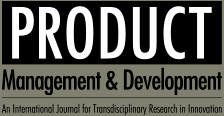Modularity in product development: a literature review towards a research agenda
Paulo Augusto Cauchick Miguel
Abstract
Modularity, which offers a very general set of principles for managing complexity, has become increasingly important because of the growing complexity of modern technology. The literature describes modularity as the process of building a complex product or process from smaller subsystems that can be designed independently yet function together as a whole. There are, in fact, three distinct perspectives in modularity: modularity in design, modularity in production, and modularity in organization. These types of modularity have gained much attention in several industrial sectors. Although the concept and application of modularity has been a subject of research over the past decade or so, various authors have pointed out the need for further progress in its research. This paper makes a review of the literature on modularity with the purpose of establishing a research agenda. To this end, a number of works are examined considering their research focus and approaches, seeking to draw up and propose such an agenda. The paper concludes that research agenda should consider issues such as the need to develop a conceptual model to represent modularity in all its perspectives, as well as studies concerning the organizational implications involved in decisions for modular product development.

